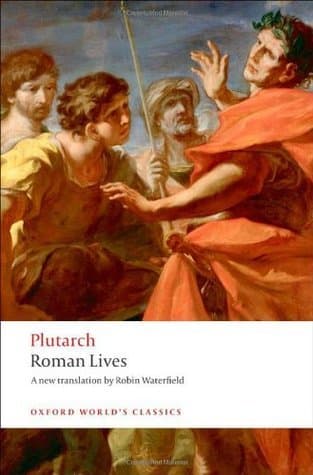
Book Review Summary: Roman Lives: A Selection of Eight Lives (Aemilius Paulus, Tiberius Gracchus and Gaius Grachus, Marius, Sulla, Pompey, Caesar, Marc Anthony)
Introduction
In "Roman Lives: A Selection of Eight Lives," Plutarch presents a collection of biographies that delve into the lives and times of eight prominent Romans. These individuals, including Aemilius Paulus, Tiberius Gracchus and Gaius Grachus, Marius, Sulla, Pompey, Caesar, and Marc Anthony, played significant roles in the history of ancient Rome. Through his engaging narrative style and rich prose, Plutarch offers readers a unique perspective on the virtues and vices of these historical figures. This book review summary will explore the author's background, analyze readers' views on the book, and provide reasons for both recommending and not recommending this title.
About Plutarch
Plutarch (later named Lucius Mestrius Plutarchus) was a Greek historian, biographer, and essayist known for his works such as "Parallel Lives" and "Moralia." He lived during the late 1st and early 2nd centuries AD and was classified as a Middle Platonist. Plutarch's surviving works were written in Greek, but he intended them to be accessible to both Greek and Roman readers. His biographical approach and natural storytelling ability have made him a renowned figure in the field of ancient history.
Analysis of Views
- Depiction of power: Readers praise Plutarch's portrayal of the "lust to dominate" in the lives of Caesar, Pompey, and Marc Antony. They find these biographies particularly captivating and insightful.
- Historical value: The book is considered a valuable source for understanding the Republican period of Rome, apart from Appian. Readers appreciate Plutarch's accounts of the major figures and events that shaped this era.
- Engaging narrative: Plutarch's storytelling ability is widely recognized, with many readers finding his biographies captivating even 2000 years after they were written. The inclusion of anecdotes and interesting details adds to the charm of the book.
- Relevance to contemporary issues: Some readers appreciate the relevance of Plutarch's work to modern political strategists and its applicability to contemporary issues. The themes of military victories, iron-fisted rule, and political intrigue resonate with readers even today.
- Lack of context: Some readers express disappointment with the lack of context provided in Plutarch's works. They feel that more background information on the characters would have enhanced their understanding of the events described.
- Overlapping lives: Readers note that some lives in the book overlap, which can make it challenging to follow certain narratives. However, they also find this interweaving of stories interesting and engaging.
Reasons for Recommendation
- Historical value: The book offers a comprehensive selection of eight lives that cover significant periods in Roman history. It provides readers with valuable insights into the political landscape of ancient Rome.
- Engaging narrative: Plutarch's storytelling ability captivates readers and makes the biographies enjoyable to read. His use of anecdotes and interesting details adds depth to the historical accounts.
- Relevance to contemporary issues: The themes explored in the book resonate with readers even today, making it relevant beyond its historical context. It offers valuable lessons on power, leadership, and morality that can be applied to contemporary political situations.
Reasons for Not Recommendation
- Lack of context: Some readers find it challenging to follow certain narratives due to the lack of context provided by Plutarch. They feel that more background information would have enhanced their understanding of the events described.
- Overlapping lives: While some readers appreciate the interweaving of stories in the book, others find it confusing or overwhelming at times. The overlap between certain lives can make it difficult to follow specific narratives.
Conclusion
"Roman Lives: A Selection of Eight Lives" by Plutarch offers readers a captivating glimpse into the lives and times of eight prominent Romans who played significant roles in ancient Rome. Through his engaging narrative style and rich prose, Plutarch presents a collection of biographies that explore the virtues and vices of these historical figures. While some readers appreciate the historical value and relevance of the book, others find it challenging due to the lack of context provided and the overlapping lives presented. Overall, "Roman Lives" is a valuable resource for those interested in Roman history and offers a unique perspective on the lives of these influential individuals.